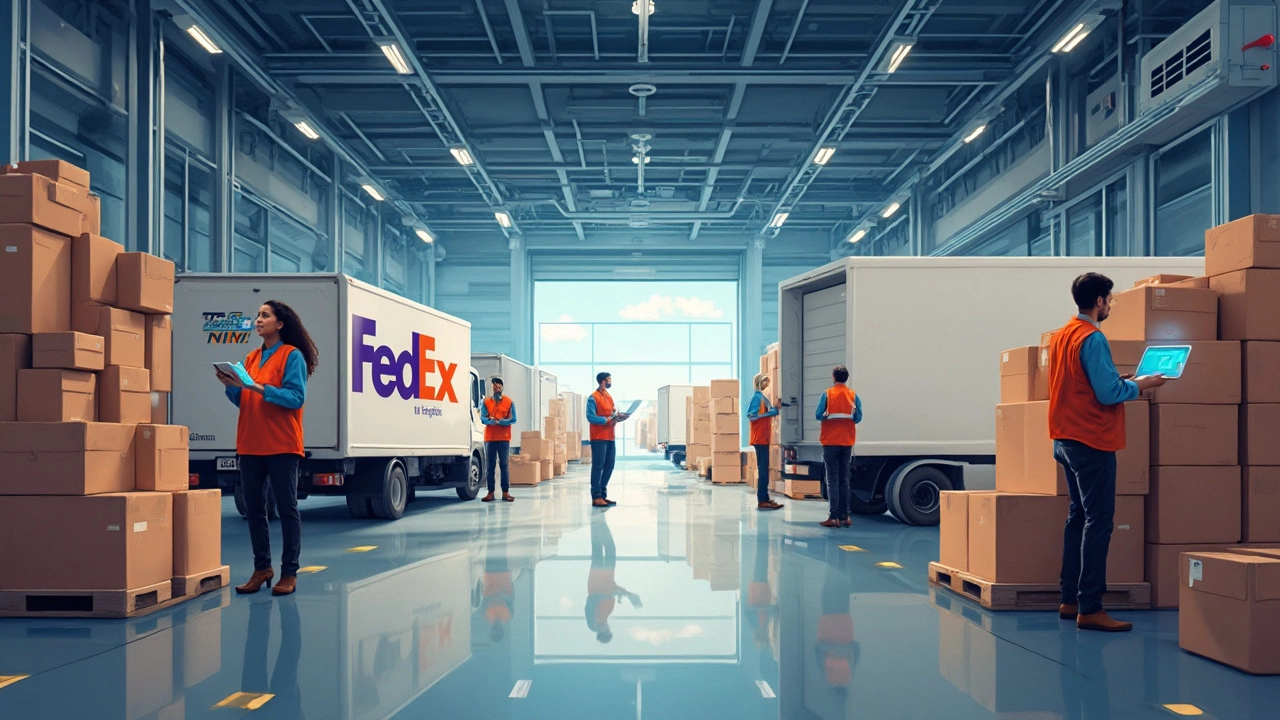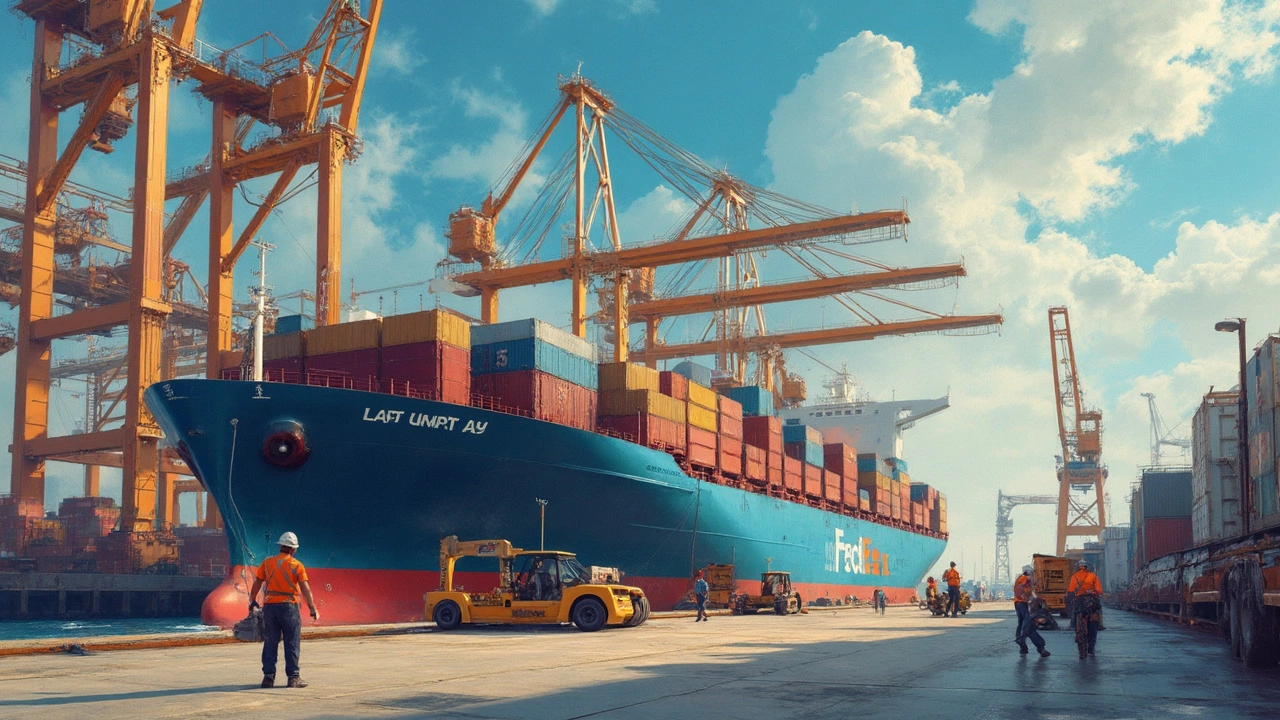So, is FedEx a freight forwarder or not? It's a bit more nuanced than just a yes or no answer. Freight forwarding involves organizing shipments, but it’s not just about moving stuff from A to B. It’s like playing logistics chess—strategizing every move to avoid pitfalls.
FedEx, on the other hand, is a name we often associate with fast, reliable deliveries. But does that make them a freight forwarder? Well, they do offer plenty of services like international shipping, customs brokerage, and supply chain solutions, which are all part of the freight forwarding world.
But there's more to this story. Traditional freight forwarders manage a range of logistics, often working with various carriers to tailor routes and costs. FedEx primarily uses its own fleet, which is a major difference. So, while FedEx shares some similarities with freight forwarders, they also stand apart in key ways.
- Understanding Freight Forwarding
- FedEx's Role in Shipping
- Services Offered by FedEx
- Comparing Freight Forwarders and FedEx
- Practical Tips for Choosing Logistics Partners
Understanding Freight Forwarding
Freight forwarding might sound like a mystical trade from a Harry Potter book, but it’s actually straightforward once you break it down. It’s all about facilitating the transport of goods between one destination and another. Think of freight forwarders as the logistical dream team that handles the nitty-gritty of the shipping process.
These guys know every bit about the shipping industry and act as a bridge between the shipper and the transportation services. Wondering what they actually do? Here's a brief glimpse.
Key Roles of a Freight Forwarder
- Organizing Shipping Routes: They craft the best routes, balancing speed, cost, and reliability all at once.
- Customs Documentation: Handling paperwork like customs forms and commercial invoices make sure shipments don’t get stuck at borders.
- Handling Cargo Insurance: Insurance isn’t just about cars and homes; cargo needs coverage too, and these forwarders sort that out.
- Warehouse Management: Sometimes freight forwarders manage storage spaces to keep goods safe on their journey.
Now, why is this all-important, you ask? Well, freight forwarding makes global trade possible and seamless. By managing these details, businesses can focus more on selling and less on shipping hurdles.
| Year | Global Freight Forwarding Revenue (USD Billion) |
|---|---|
| 2021 | 160 |
| 2022 | 176 |
| 2023 | 185 |
Hopefully, you're seeing the bigger picture now. The freight forwarder doesn’t physically move items nor are they limited to one transport mode. Instead, they’re like the maestro of an intricate symphony, orchestrating transport via air, land, sea, and sometimes all three, using a network of carriers.
So, while the processes might seem pretty vast, having the right freight forwarder can make even the most complex logistics look easy.
FedEx's Role in Shipping
When people think of FedEx, it's usually their speedy delivery times and global reach that come to mind. They’ve built a reputation for getting parcels from one corner of the globe to another, often in a matter of days. But what exactly is their role in the bigger picture of shipping and logistics?
The FedEx Toolbox
FedEx wears many hats. They're not just about dropping off your online shopping orders. They’ve got a whole suite of services that cater to different needs. For one, there's international shipping, which is crucial for businesses looking to tap into global markets. They offer reliable transit times, which means businesses can promise their customers overseas delivery that won’t keep them waiting.
On top of that, FedEx deals with customs brokerage. This means they help smooth over all the red tape and nitty-gritty paperwork that comes with cross-border shipping. This feature is a game-changer for businesses that find navigating customs a bit intimidating.
FedEx vs. Traditional Freight Forwarding
What sets FedEx apart from a typical freight forwarder is its fleet. FedEx operates its own network of air and ground transportation, enabling them to offer integrated services. A traditional freight forwarder might rely on third-party carriers and juggle various options to piece together the best route and price for shipping goods. FedEx simplifies this by handling much of it themselves.
| Service | Offered by FedEx? |
|---|---|
| International Shipping | Yes |
| Customs Brokerage | Yes |
| Third-Party Carrier Management | No |
| Global Fleet Usage | Yes |
The Flexibility Factor
While FedEx does cover many bases, some companies still prefer traditional forwarding services for their flexibility in terms of negotiating rates with multiple carriers or customizing shipping routes. So, while FedEx is great for one-stop solutions, businesses with unique or complex shipping needs might still lean towards freight forwarders.
In a nutshell, FedEx might not fit the exact mold of a freight forwarder, but its role in the shipping world is hugely significant thanks to its wide range of services and comprehensive network.

Services Offered by FedEx
When you're shipping with FedEx, you get a lot more than just a transportation service. They’ve got a suite of options that cover different shipping needs, whether you're sending a parcel across town or managing a complex supply chain.
Domestic and International Shipping
FedEx offers both domestic and international shipping options. They utilize various methods such as air, ground, and freight services to ensure your package arrives when it should. If you’re in the U.S., FedEx Express is perfect for urgent deliveries while FedEx Ground handles less time-sensitive shipments.
Customs Brokerage
International shipping can be a headache due to customs regulations. Luckily, FedEx provides customs brokerage services to manage paperwork and compliance issues. This means fewer delays and a smoother process, making life easier for businesses shipping across borders.
Supply Chain Solutions
FedEx doesn’t just drop off packages; they also offer supply chain services to streamline operations. This includes warehousing, distribution, and order fulfillment. If you've got a business needing logistics support, FedEx helps create a smoother end-to-end experience.
FedEx Freight
This service stands out for handling larger, bulkier shipments. Whether it’s less-than-truckload (LTL) or full truckload (FTL), FedEx Freight provides flexible options for businesses of all sizes tackling bigger jobs.
Specialty Services
FedEx isn't just about getting packages from point A to point B. They offer specialty services like temperature-controlled shipping for sensitive items and even hazardous goods shipping, equipped with the necessary care and compliance.
Bonus: FedEx Delivery Manager
This tool lets you track packages, manage delivery times, and even reroute shipments. It puts more control in your hands, which is a big win for both sender and receiver.
Quick Stats
Here’s a quick look at some numbers showing FedEx’s scale:
| Service | Daily Capacity |
|---|---|
| FedEx Express | Over 4 million packages |
| FedEx Ground | About 8 million packages |
With these services, it's clear that FedEx brings a lot to the table, often acting in ways similar to a freight forwarder, but with their own unique twist.
Comparing Freight Forwarders and FedEx
When it comes to logistics, the differences between traditional freight forwarders and FedEx are worth noting. Freight forwarders are often seen as logistics maestros, orchestrating everything from shipping routes to customs paperwork. They’re the behind-the-scenes players, ensuring goods move smoothly across global networks.
On the flip side, FedEx is a household name for express deliveries—like when you need an urgent package delivered halfway across the planet before tomorrow's deadline. However, FedEx doesn’t just stick to only urgent packages. They have a vast logistics network and provide many of the same services as freight forwarders, like cargo transport and warehousing, but do this mostly using their own planes, trucks, and infrastructure.
Network vs. Fleet
Traditional freight forwarders are all about flexibility. They leverage connections with various airlines, shipping lines, and other transport services to find the best options for their clients. This means they can sometimes offer more customized solutions. Think of them as the logistics matchmakers!
FedEx, on the other hand, has its own extensive network of planes, trucks, and sorting facilities around the globe. This brings a couple of advantages. First, there’s a certain control over the transit, which can lead to more predictable delivery times. But it also means you're typically sticking within the FedEx ecosystem.
Services Portfolio
The main kicker? While freight forwarders might outsource parts of the shipment process to a wide range of partners, FedEx covers end-to-end shipping within its umbrella. This can make things seamless but less customizable compared to the versatile solutions of forwarding experts.
Ultimately, deciding between a traditional freight forwarder and FedEx depends on what you’re looking for—a tailored, flexible service or a direct, streamlined option.
| Feature | FedEx | Freight Forwarders |
|---|---|---|
| Own Fleet | Yes | No |
| Leverages Multiple Carriers | No | Yes |
| Customizable Solutions | Limited | Varies |
| Global Network | Extensive | Extensive through partners |
Whatever your needs might be, it’s clear that both have their unique advantages and can play pivotal roles depending on the specific logistics challenges you face.

Practical Tips for Choosing Logistics Partners
So, you're on the hunt for the right logistics partner, huh? It can feel like finding the perfect puzzle piece to complete your business strategy. Let’s break down what you should really look for.
1. Understand Your Needs
First up, assess what your business needs. Are you shipping internationally, or is it mostly domestic? Do you need just shipping services or more like warehousing and inventory management too? Clearly understanding this will help narrow down your options.
2. Check Reliability and Reputation
No brainer, right? But don't just go by glossy advertisements or the salesperson's promises. Check online reviews, ask other businesses in your network, and even ask the logistics companies for references. A good track record in reliability shows they're trusted and can handle your needs like a pro.
3. Range of Services
Look for companies that offer a broad range of services you might need. This includes shipping options, customs brokerage, supply chain solutions, and even specific industry solutions if applicable. For instance, FedEx provides integrated services beyond just moving boxes—think programming your logistics on autopilot.
4. Pricing Flexibility
Gone are the days when you'd settle for rigid pricing. Especially with the variety in logistics needs, flexible pricing can be a big benefit. Compare offers and see if the pricing matches the quality and depth of the service offered. Sometimes an affordable deal might lack hidden services you truly need.
5. Customer Service
Don't underestimate the power of good customer service. You want a logistics partner who is there to help when things don't go as planned (because let’s be real, it happens!). Responsive and helpful support can save you major headaches down the line.
6. Technology & Innovation
Finally, go for partners who embrace technology. Things like real-time tracking, automation, data analytics, and mobile solutions can make a big difference in efficiency and transparency. Fun fact—using such advanced tools, companies often report a 20% increase in delivery accuracy, as per industry experts.
Bonus Tip: Visit On-Site
If possible, visit your logistics partner's facility. It’ll give you an idea about their operations first-hand and if they’re up to the mark with what you expect.
Choosing the right partner is about long-term gains, not just instant wins. Keep these tips in mind, and you’re well on your way to making a smart choice!


